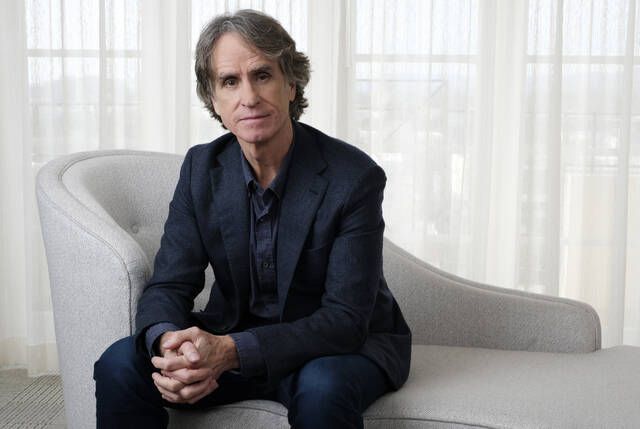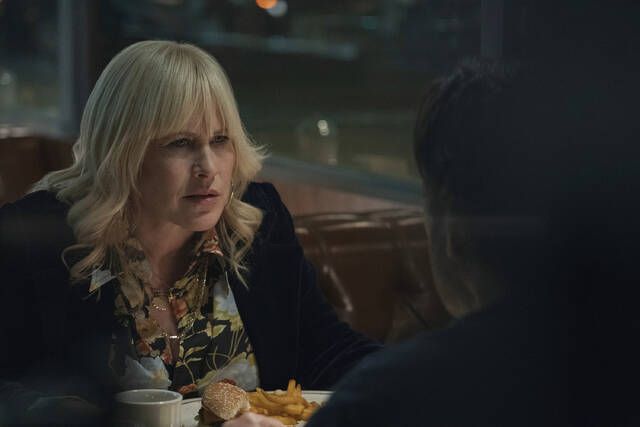
Jay Roach, director of the film “Bombshell,” poses for a portrait in Beverly Hills, Calif.. Roach has ventured into television, directing all eight-episodes of the Apple TV series “High Desert,” starring Patricia Arquette.
AP photo
Click here to subscribe today or Login.
Filmmaker Jay Roach usually has a moment of panic and doubt before production starts on a project.
It’s something Sydney Pollack, who was a mentor of his, once assured him was normal. He’d also read something similar about Mike Nichols in Mark Harris’s biography. Good company to be in, sure, but still not the greatest feeling to be thinking “I’ve made a horrible mistake and how can I get out of this?”
But for his latest endeavor, “ High Desert,” his first foray into episodic television, he didn’t have that. Currently five episodes into its eight-episode run on Apple TV+, “High Desert” stars Patricia Arquette as a hustler named Peggy Newman, an ex-addict and dealer scraping by in the Southern California desert, working as a saloon girl in an Old West themed park. Her husband (Matt Dillon) is in jail. Her mother (Bernadette Peters) has recently died. And more strait-laced siblings (Christine Taylor, Keir O’Donnell) are looking to sell the home she lives in. In an attempt to make some extra money to keep her place, she decides to pick up P.I. work on the side. And she’s not bad at it, though her methods are different from her reluctant Philip Marlowe-styled boss (Brad Garrett).
Peggy, Roach said, was like a “rock ‘n’ roll Lucy Ricardo.” She’s dysfunctional on one level, but also has a wholly unique swagger and confidence that’s not unwarranted, which comes to life through Arquette’s singular performance, partly inspired by Patti Smith and The Runaways.
Roach got the script, written by Nancy Fichman, Jennifer Hoppe (“Nurse Jackie”), and Katie Ford (“Miss Congeniality”), from Ben Stiller, a longtime friend who is an executive producer, to see if he’d consider directing the pilot. Soon, Roach was asking to do all eight.
“It was heartbreaking and darkly funny,” he said. “Patricia talked about how people cope and how a character like Peggy might go off to be isolated but then ends up kind of collecting other lost people. I thought that was really moving, this idea of coping with tragedy and grief through a very off-center approach to life.”
Roach has made a career directing features, including the “Austin Powers” trilogy, two “Meet the Parents” movies, “Mystery, Alaska” and, more recently, “Bombshell,” as well as acclaimed HBO political dramas like “Recount” and “Game Change,” both of which won him Emmys.
Though he’s still developing films, including a glamorous “Ocean’s Eleven” movie, set in Monte Carlo in 1962 and starring Margot Robbie and Ryan Gosling, he’d been interested in diving into longer-form storytelling.
“You get to go much deeper into character and develop more characters in a complicated set of predicaments,” Roach said. “As a consumer of a great long-form TV, I love having time to get to know people, to find out what really makes them tick and really get lost in their predicament with them. The empathy factor can be even stronger.”
Plus, the desert is a place he knew well. He grew up on the outskirts of Albuquerque, New Mexico. The series would be in the Mojave Desert in Yucca Valley, California, a town bordered by the San Bernardino Mountains and the Joshua Tree National Park. It’s the kind of place where, next to a run-down plywood shack, it’s not entirely unusual to see a single post with a Tesla charger.
“In Joshua Tree, everyone is a bit of a rebel and a recluse or, you know, a refugee of some sort,” he said. “All types of classes come out there to get away and end up hanging out with each other. There’s so many contradictions and there is such a strong sense of community because there’s almost a bonding over facing the challenges of surviving.”
For the series, that meant larger than life characters, who are also doing some genuine soul searching, like Rupert Friend’s “Guru Bob,” a former local newscaster who had an on-air breakdown and remade himself as a self-styled guru in the desert. He’s also being hunted by some bad people.
“Everyone’s so quirky out there so there’s going to be absurdity, there’s going to be irony, there’s going to be comedy,” he said. “The tone is tricky, though. It gets broad and farcical at times but it veers back into something that’s very, very emotional.”
The cast was key – a group of actors who are “comedy capable,” Roach said, even if they’re not known for comedy. The music helped enormously, too. From music supervisor Maggie Phillips to the cast, everyone had something to contribute.
Soundtrack choices range from cheeky, Mel Tormé’s “Nice Work if You Can Get It” and Frank Sinatra belting “I’ve Got the World on a String,” to the more sincere and soul searching in Kevin Morby & Waxahatchee’s cover of “Farewell Transmission” and Ellen McIlwaine’s 1972 heartbreaker “Can’t Find My Way Home.”
“There’s a number of songs that are pure irony, that we use as buttons at the end of the episodes,” Roach said. “Others give you permission to connect to those emotional zones.”
Roach listened to the McIlwaine song every day on his drive to the set. It felt to him like the heart and spirit of the show.
Even with the trickiness of shooting during COVID-19, budget ceilings and the quick pace of television, it was one of his best experiences. The vibes, he said, were just so good. He never even once “tried to get out of it.”






